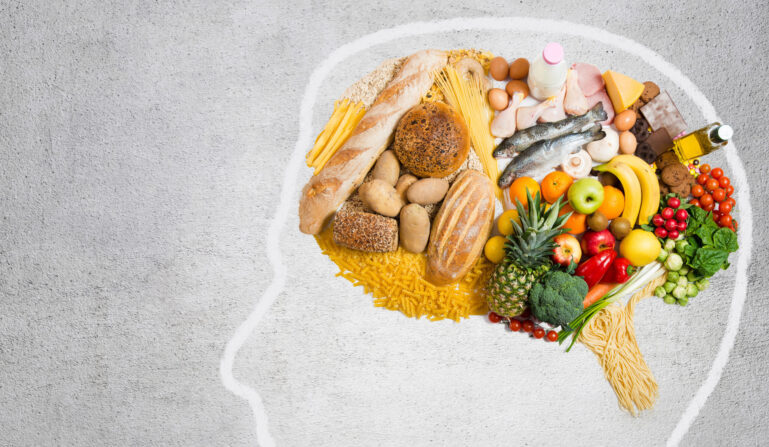This new serial column on nutrition is for clinicians seeking more in-depth insights into the link between mental health and the body and the importance of understanding proper nutrition on the brain and emotional health.
The field of neuronutrition is an exciting and ever-evolving holistic, integrative, and interdisciplinary field of study. At its core, the field of neuronutrition is concerned with how nutrition impacts brain health, mental functioning, and performance. Within brain health, molecular targets in neuronutrition include gut-brain axis disturbance, mitochondrial dysfunction, neuroinflammation, neurotransmitter imbalance, and oxidative/nitrosative stress (exposure to excessive reactive oxygen species; Badaeva et al., 2023). Some authors place the term neuronutrition within the field of nutritional neuroscience which studies the effects of dietary components: carbohydrates, fats, proteins, and supplements on the peripheral and central nervous system. Neurobiology, neurochemistry, behavior and cognition are fields often included in neuronutition (Zamroziewicz & Barbey, 2016). Regardless of its exact definition, maintaining optimal brain health and functioning requires one to eat a balanced and healthy diet.
Research supports the role of nutritional deficits in the development of a range of issues, from oxidative stress and neuroinflammation to cognitive impairment to psychiatric disorders. For example, neuroscience has demonstrated that poor dietary habits can alter the gut microbiome, which in turn affects the gut-brain axis, contributing to conditions such as depression and anxiety (Mörkl et al., 2020). The most common way providers will see these issues exhibited in their clients is through poor nutrition; diets lacking in vegetables and fruits, high in sugar, high in saturated fats, and the consumption of highly processed foods (Badaeva et al., 2023; Novikov et al., 2023; Tsalamandris et al., 2023). These are additional reasons why a neuronutrition approach in conjunction with other mental health-related interventions are desperately needed.

Of course, other healthy lifestyle factors, such as getting proper sleep, staying hydrated, managing one’s stress level, and being in relationships with healthy and positive people are also major contributing factors for appropriate brain and body functioning. For instance, a healthy lifestyle can prevent neurogenerative diseases and neuroinflammation (Kip & Parr-Brownlie, 2023). Professionals who engage clients in these areas typically have advanced education, experience, training, and consultation in the areas of nutritional science, neuroscience, biochemistry, and functional medicine. Depending on one’s area of practice and focus, the first author has also found it helpful to learn about and seek out additional training and education in areas related to behavioral health, neurocounseling, psychoneuroimmunology, psychogastroentronology, sleep science, exercise prescription, and neurocriminology. Regardless of background, professionals are strongly encouraged to consult with other experts or work as part of a multidisciplinary team to ensure that evidence-supported interventions are utilized.
The field of neuronutrition also has significant implications for the prevention and treatment of various psychiatric and substance use disorders. Unfortunately, many individuals who seek services from mental health and substance use treatment providers do not consume healthy foods and often engage in other unhealthy lifestyle choices and habits. As such, this can adversely impact the client’s cognitive, behavioral, psychological, and physical health functioning (See Table 1). Therefore, the aim of this article is to introduce mental health clinicians, substance use treatment providers, and allied professionals to the field of neuronutrition.
Table 1: Disorders, conditions, and diseases discussed within the neuronutrition literature.
- Brain and nervous system
- Alzheimer’s disease
- Dementia
- Amyotrophic lateral sclerosis
- Autoimmune disorders
- Epilepsy
- Inflammation
- Migraines
- Multiple Sclerosis
- Parkinson’s disease
- Stroke
- Wernicke’s encephalopathy
- Dietary
- Constipation
- Crohn’s disease
- Irritable bowel syndrome
- Gut-brain axis disturbances
- Metabolic syndromes
- Mast Cell Activation
- Histamine Intolerance
- Digestive Insufficiency
- Malabsorption
- Physical
- Coronary disease
- Cardiovascular events
- Cancer
- Diabetes
- Pulmonary arterial hypertension
- Hypotension (Novikov et al., 2023)
- Sensory impairment (Novikov et al., 2023)
- Neuropsychiatric and Neurodevelopmental
- Anxiety disorders (e.g., generalized anxiety disorder)
- Attention-deficit/hyperactivity disorder
- Autism spectrum disorder
- Chronic stress
- Mood disorders (e.g., depression)
- Schizophrenia spectrum disorders
- Alcohol-related neurological disorders (Badaeva et al., 2023)
- Other conditions
- Chronic pain
- Sleep disturbances
- Small Intestinal Bacterial Overgrowth
- Celiac disease
- Cirrhosis
- Sex hormone imbalances
Dietary supplementation
The topic of dietary supplementation is frequently discussed within the neuronutrition literature. The primary goal of this section is to highlight some of the key dietary supplementation research noted in the neuronutrition literature as it pertains to omega-3 polyunsaturated fatty acids (PUFAs) and probiotics. In future articles, we will highlight other dietary supplementation research findings as they pertain to a variety of health conditions. Most studies of human and animal brains suggest that a deficiency in PUFAs may induce various neuropsychiatric and behavioral disorders, including anxiety-related behaviors (Müller et al., 2015). PUFA deficiencies have also been found to increase the risk of developing bipolar disorder, ADHD, schizophrenia, depression, and other disorders (Lange, 2020).

Several PUFAs are dietary essential fatty acids that cannot be synthesized by mammals, but must be provided in the diet. Omega-3 PUFAs make up about 35% of the brain’s lipids, with the most abundant omega-3 in the brain being docosahexaenoic acid (DHA). DHA comprises about 50% of the neuronal plasma membrane (Dighriri et al., 2022). DHA depletion affects multiple areas of the brain, with the most severely affected areas being the cerebellum, striatum, hippocampus, cortex, and pituitary gland (Xiao et al., 2005). Together, these brain regions play critical roles in executive and emotional functioning (Ashley et al., 2017; Schutter, 2020; Pagliaccio et al., 2015). Moreover, altered activations and connectivity in these areas is associated with depression (Krishnan, et al. 2008) anxiety (Won & Kim, 2020). A recent meta-analysis of peer-reviewed publications indicates that supplementation with long-chain omega-3 probably has little or no effect on preventing depression or anxiety symptoms (Deane et al., 2021); however, the majority of the research examined short-term supplementation. Thus, longer-term supplementation studies must be conducted for a definitive answer. Further, studies conducted with PUFA supplementation to mitigate symptoms of schizophrenia are not conclusive. Similar studies with patients exhibiting autism spectrum disorders, obsessive-compulsive disorder, eating disorders, and substance use disorder may be promising, but are too scarce to draw any conclusions (Bozzatello et al., 2016). In addition, research on probiotic supplementation in the treatment of mental illnesses, including schizophrenia, bipolar disorder, and major depressive disorder, is encouraging. As the study of the relationship between gut microbiome and mental health increases, the role of probiotics shows promise. Clinical trials are not plentiful at this point. Nevertheless, mental health professionals should remain aware of the possibilities and forthcoming research (Johnson et al., 2021). In future articles, we will examine the topic of probiotic supplementation in greater detail.
Potential benefits associated with neuronutrition approaches and interventions
Neuronutrition interventions are most effective when based on a holistic and comprehensive individualized approach to intake, screening, assessment, and treatment planning. Reduction of oxidative/nitrositive stress and neuroinflammation have been long studied through changes in diet along with the addition of moderate exercise. There is consideration for the personalized approach being the most effective method for maintaining brain health. This approach includes the adaptation of scientific findings to psychophysiological aspects, genetic factors, biochemistry dynamics, and environmental features that are unique to each individual (Badaeva et al., 2023).

As part of a comprehensive approach to treatment, mental health and substance use treatment providers should consider working with other professionals who are trained and hold the appropriate degrees, certifications, and licenses to competently utilize neuronutrition-based interventions aimed at treating a wide array of brain-related symptoms, diseases, and disorders. This is typically done through a holistic and individualized approach that often involves working in conjunction with the client’s other healthcare and mental health providers.
The benefits associated with the use of neuronutrition approaches can be diverse and may include enhanced:
- Overall health
- Well-being
- Lifestyle habits
- Overall performance in school and at work
- Resilience to disease
- Neurological features
- Brain plasticity
- Gut-brain axis balance
- Hormonal balance
- Decreased Inflammation
- Nervous system functioning
- Cognition
- Concentration and focus
- Decision-making
- Information processing
- Mental clarity
- Short- and long-term memory
- Emotional
- Decreased anxiousness
- Decreased depression
- Mood stability
- Stress management
- Physical
- Blood sugar regulation
- Digestive health
- Energy
- Sleep
- Weight control
- Optimized digestion and absorption
Strengths and benefits of becoming neuronutrition-informed
Strengths associated with the field of neuronutrition include:
-
- Addressing nutritional deficits
- Customizable for each client
- Directly addressing modifiable lifestyle factors
- Minimizing the severity of existing conditions
- Potentially preventing onset of neurological and mental health conditions
- Targeted nutrient repletion
Benefits associated with the field of neuronutrition include improved understanding of:
-
- Affect
- Aging
- Brain health
- Central nervous system
- Circadian Rhythm misalignment
- Cognition
- Dietary patterns
- Gut–brain axis dysfunction
- Hormonal dysregulation
- Hypothalamic-pituitary-adrenal axis
- Immune system functioning
- Inflammatory responses
- Mitochondrial dysfunction
- Mood and behavioral instability
- Neurotransmitter imbalances
- Nutrient functions
- Phytonutrient diversity
- Psychiatric disorders
- Trajectories of neurological conditions
Key takeaway points
Below are several important reminders and key takeaway points mental health professionals need to consider when learning about the field of neuronutrition:
Neuronutrition and why it matters
- Neuronutrition is an emerging field of study that focuses on how nutrition can impact neurological, psychiatric, and brain health.
- Neuronutrition’s aim is to exchange unhealthy dietary patterns that increase chronic disease risk development with healthy dietary patterns that promote brain health (Jayedi et al., 2020).
- Neuronutrition is composed of several different subdisciplines including nutritional epigenetics, nutritional neurocognition, and nutritional neurochemistry.
- Different components of neuronutrition include functional foods, supplements, medications, and diets in general.
- Brain health is concerned with brain functioning in different domains including cognition, sensation, affect, and behavior. There is evidence that nutrition is vital to managing the risk of and treatment of depressive disorders. As healthy diets and lifestyles have decreased over the years, depressive disorders have increased (Badaeva et al., 2023).
- Neuronutritional approaches can help address issues in the areas of immunity, metabolism, and behavior.
- Common molecular areas of concern in neuronutrition include the gut-brain axis, neuroinflammation, neurotransmitters, and oxidative stress.
- Neuronutrition could play an important role in the treatment of brain disorders, conditions, and diseases.
What mental health professionals need to know about neuronutrition
9. Professionals who provide treatment for mental health issues such as anxiety and depression should consider how nutrition can play a role in the emergence of such mental health concerns.
- Optimizing brain health can play a critical role in maximizing a person’s potential and improving overall behavioral health functioning.
- Mental health professionals are advised to be mindful of the existing neurological or psychiatric disorders that may impact their client’s diets, such as those found in autism spectrum disorders (Tsalamandris et al., 2023) and eating disorders (Badaeva, et al., 2023).
- The type and amount of food consumed along with the time of consumption are critical considerations of neuronutrition.
- Evaluation of a person’s brain health should rely on evaluations of nutrition, metabolism, and other biochemical indicators.
- A comprehensive nutrition and lifestyle approach should include all areas related to biochemical assessment of key markers including hormones, neurotransmitters, cellular level nutrients, and thyroid function in order to create an environment for optimal neurological function.
Engaging with neuronutrition
- Before engaging in neuronutrition practices, it is imperative to ensure that the professional has completed and obtained the proper education, training, experience, certifications, and licensures that align with practice requirements in their state.
- Mental health professionals are encouraged to pursue ways they can partner with nutritionists, dietitians, and other medical professionals to provide nutrition based-interventions.
- Medical professionals have a clear understanding on the use of drugs to treat people with various behavioral health substance use disorders, but now much scientific evidence points to the central role of nutrition/healthy diets, exercise and stress management in personal care, psychoeducational topics accessible to mental health clinicians.
- Neuronutrition interventions in clinical practice work best when adopting an integrated, individualized, and collaborative approach that considers both biological, biochemical, genetic, environmental, and psychophysiological factors.

Jerrod Brown, PhD, MA, MS, MS, MS, is a professor, trainer, researcher, and consultant with multiple years of experience teaching collegiate courses. Jerrod has completed four separate master’s degree programs and holds graduate certificates in Medical Biochemistry, Exercise Prescription, Neuroscience and the Law, Neuropsychology, Autism Spectrum Disorder (ASD), Other Health Disabilities (OHD), and Traumatic-Brain Injuries (TBI). Currently, Jerrod is pursuing his fifth master’s degree in Applied Clinical Nutrition from Northeast College of Health Sciences.

Bettye Sue Hennington, PhD, is a professor at the University of Mississippi Medical Center, with 24 years of teaching experience in institutions of higher learning. Her research interest is in the field of metabolomics specifically in the causes of low birth weight in newborns.

Tiffany Flaten, MEd, MS, CNS, LN, Is the founder of Rock Bottom Wellness, is a board certified nutritionist specializing in thyroid and hormone imbalances. With a BS in Biology, MEd in Teaching & Learning, and MS in Nutrition and Human Performance, Tiffany combines scientific knowledge with educational expertise.

Jeremiah Schimp, PhD, MA, LPCC, is an Assistant Professor of Psychology at Concordia University, St. Paul. He has taught psychology since 2016, specializing in counseling and psychopathology. He has worked in the mental health field since 2004, focusing his clinical career on adults diagnosed with serious and persistent mental illnesses and substance use disorders. Dr. Schimp holds a BA in Psychology, a MA in Counseling Psychology and a PhD in Psychology with a specialization in health psychology. He is a Licensed Professional Clinical Counselor in the state of Minnesota and holds certifications in integrative mental health, addiction, and trauma.

Jennifer Sweeton, PsyD, MS, MA, is a clinical and forensic psychologist specializing in the assessment and treatment of trauma- and stressor-related disorders. Dr. Sweeton owns a private practice, and is an adjunct faculty member at the University of Kansas School of Medicine. She completed her doctoral training at the Stanford School of Medicine, Palo Alto University, and the National Center for PTSD.
Ashley, M. J., Ashley, J. G., & Ashley, M. J. (2017). Neuroanatomy of basic cognitive function. In Traumatic Brain Injury (pp. 77-106). CRC Press.
Badaeva, A. V., Danilov, A. B., Clayton, P., Moskalev, A. A., Karasev, A. V., Tarasevich, A. F., … & Novikov, V. N. (2023). Perspectives on neuronutrition in prevention and treatment of neurological disorders. Nutrients, 15(11), 2505.
Bozzatello, P., Brignolo, E., De Grandi, E., & Bellino, S. (2016). Supplementation with omega-3 fatty acids in psychiatric disorders: a review of literature data. Journal of clinical medicine, 5(8), 67.
Deane, K. H., Jimoh, O. F., Biswas, P.’ O’Brien, A., Hanson, S., Abdelhamid, A. S., … & Hooper, L. (2021). Omega-3 and polyunsaturated fat for prevention of depression and anxiety symptoms: systematic review and meta-analysis andomizedsed trials. The British Journal of Psychiatry, 218(3), 135-142.
Dighriri, I. M., Alsubaie, A. M., Hakami, F. M., Hamithi, D. M., Alshekh, M. M., Khobrani, F. A., … & Tawhari, M. Q. (2022). Effects of omega-3 polyunsaturated fatty acids on brain functions: a systematic review. Cureus, 14(10).
Jayedi, A., Soltani, S., Abdolshahi, A., & Shab-Bidar, S. (2020). Healthy and unhealthy dietary patterns and the risk of chronic disease: an umbrella review of meta-analyses of prospective cohort studies. British Journal of Nutrition, 124(11), 1133-1144.
Johnson, D., Thurairajasingam, S., Letchumanan, V., Chan, K.,, & Lee, L. (2021). Exploring the role and potential of probiotics in the field of mental health: major depressive disorder. Nutrients, 13(1728), 1-18.
Kip, E., & Parr-Brownlie, L. C. (2023). Healthy lifestyles and wellbeing reduce neuroinflammation and prevent neurodegenerative and psychiatric disorders. Frontiers in Neuroscience, 17, 1092537.
Krishnan, V., & Nestler, E. J. (2008). The molecular neurobiology of depression. Nature, 455(7215), 894-902.
Lange, K. W. (2020). Omega-3 fatty acids and mental health. Global Health Journal, 4(1), 18-30.
Mörkl, S., Wagner-Skacel, J., Lahousen, T., Lackner, S., Holasek, S. J., Bengesser, S. A., … & Reininghaus, E. (2020). The role of nutrition and the gut-brain axis in psychiatry: a review of the literature. Neuropsychobiology, 79(1), 80-88.
Müller, C. P., Reichel, M., Mühle, C., Rhein, C., Gulbins, E., & Kornhuber, J. (2015). Brain membrane lipids in major depression and anxiety disorders. Biochimica et Biophysica Acta (BBA)-Molecular and Cell Biology of Lipids, 1851(8), 1052-1065.
Novikov, V. N., Badaeva, A. V., Danilov, A. B., & Vorobyeva, Y. D. (2023, October). Precision Neuronutrition: Personalized Approaches for Optimizing Brain Health. In Biology and Life Sciences Forum (Vol. 29, No. 1, p. 20). MDPI.
Pagliaccio, D., Luby, J. L., Bogdan, R., Agrawal, A., Gaffrey, M. S., Belden, A. C., … & Barch, D. M. (2015). Amygdala functional connectivity, HPA axis genetic variation, and life stress in children and relations to anxiety and emotion regulation. Journal of abnormal psychology, 124(4), 817.
Schutter, D. (2020). The cerebellum in emotions and psychopathology. Routledge.
Tsalamandris, G., Hadjivassiliou, M., & Zis, P. (2023). The Role of Nutrition in Neurological Disorders. Nutrients, 15(22), 4713.
Won, E., & Kim, Y. K. (2020). Neuroinflammation-associated alterations of the brain as potential neural biomarkers in anxiety disorders. International journal of molecular sciences, 21(18), 6546.
Xiao, Y., Huang, Y., & Chen, Z. Y. (2005). Distribution, depletion and recovery of docosahexaenoic acid are region-specific in rat brain. British journal of nutrition, 94(4), 544-550.
Zamroziewicz, M. K., & Barbey, A. K. (2016). Nutritional cognitive neuroscience: innovations for healthy brain aging. Frontiers in neuroscience, 10, 240.
Other articles
Reimagining Resistance: An Invitation for a Systemic Exploration in MFT Supervision
The construct of resistance is frequently discussed during marriage and family therapy, yet it is often addressed without being located in a systems-oriented framework.
Danna Abraham, PhD & Afarin Rajaei, PhD
Embodiment & Equine Therapy: Anorexia Nervosa
Anorexia Nervosa is a complex disorder. The incidence of diagnosed eating disorders is estimated to be 4.95% for women, and research indicates that one in eight women in the United States are impacted by subclinical disordered eating.
Jennifer Cahill, MBA
Differences Are Not Deficits
Greetings AAMFT members! I hope all enjoyed a restful, fun, and productive summer! This was a particularly hot summer in most areas of the contiguous United States (if not all over the globe!) and I hope everyone remained safe and cool.
Silvia Kaminsky, MSEd



